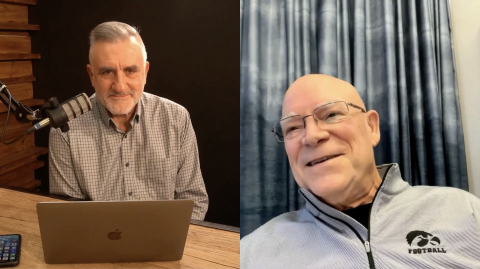What would Jesus do?
That question has been popularized in Christian circles over the years, but Pastor Troy Murphy said during his message on Sunday, Feb. 17 that because we’re not Jesus, there is a better question to ask:
How did Jesus love us?
In John 13.34-35 Jesus gave a new command to love one another. Jesus said that everyone will know his disciples by how they love one another. In other words, the true gauge of loving Jesus is how you love other people.
Here are more key points from Troy’s message, the sixth and final installment in his 'Love Beyond Belief' sermon series, which focused on how to love beyond opposition:
*In Matthew 5.10-12 Jesus praises those who are persecuted and insulted for being aligned with Him. There is an inward peace, stability and joy that God provides in spite of what’s happening on the outside.
*A person with a heart that is transformed by Jesus is capable of loving their enemies. In the book of Acts Stephen was being stoned yet asked God to forgive his accusers. That kind of love can only come from God.
*Although we don’t experience severe persecution in America, it still exists in our world. Every month in the world: 255 Christians are killed; 104 are abducted; 180 Christian women are raped, sexually harassed or forced into marriage; 66 churches are attacked; 160 Christians are detained without trial and imprisoned. In the midst of that, Jesus calls Christians to love their enemies.
*What do we do when we see someone else oppressed? In John 8.1-11 we read the story of the woman caught in adultery and Jesus’ loving response. Jesus stepped in often to protect those who were being marginalized.
Even though Jesus believes what the woman was doing was wrong, He protects her. He also doesn’t try to oppose or retaliate against her accusers. He gently reminds them that the one without sin should cast the first stone, which completely diffused the situation.
*To follow Jesus’ example, we are not to sit back and do nothing as oppression takes place against the marginalized. Like the Good Samaritan, we should take these steps:
-Move to protect the marginalized.
-Begin to care for them.
-Enter their story.
*When we are attacked we want to fight back, but Jesus said we should respond in love.
*In Matthew 5.38-42 Jesus tells us what to do when we are being oppressed. When someone slaps you, turn the other cheek. When someone takes your shirt, give them your coat. When someone forces you to go one mile, go an extra mile. These are opportunities to establish that you are created in God’s image. In essence, a level of accountability is put on your oppressor.
*Jesus tells us that instead of retaliation against an oppressor we should have a non-violent response. Rosa Parks, the famous African-American woman who sat in the front of the bus in the South to protest against segregation, is a good example of this.
*Get rid of hate, and heed Jesus’ call to love your enemies. We hate evil but shouldn’t hate people.
*Get rid of your conditional love. You should not put any conditions on those you love.
*Jesus calls us to love all people, always. That can be difficult, but if we retaliate, we are no different than our oppressors.
*Get rid of your resentment because bitterness and resentment will rot your bones.
*We are called to move toward vulnerability and humility. When we are harmed, instead of being self-sufficient we should admit we are needy, that we need a savior and that we need each other.
*The only way we can begin to love beyond belief, in persecution, is having God’s surpassing power in us. We need to surrender to the Holy Spirit.
Discussion questions
*Is there someone you struggle to love? How can you overcome any bitterness or resentment?
*When have you come alongside someone that was oppressed?
*Is there someone being oppressed right now that you could protect, care for and enter into their story? How will you do that?
*When have you experienced the inner peace God offers, even in the midst of struggles or persecution?



